
A90 Ch10 Overview of Macroeconomics Economics ECONOMICS MANAGEMENT SCHOOL,TONGJI UNIVERSITY
Economics ECONOMICS & MANAGEMENT SCHOOL, TONGJI UNIVERSITY Ch10 Overview of Macroeconomics
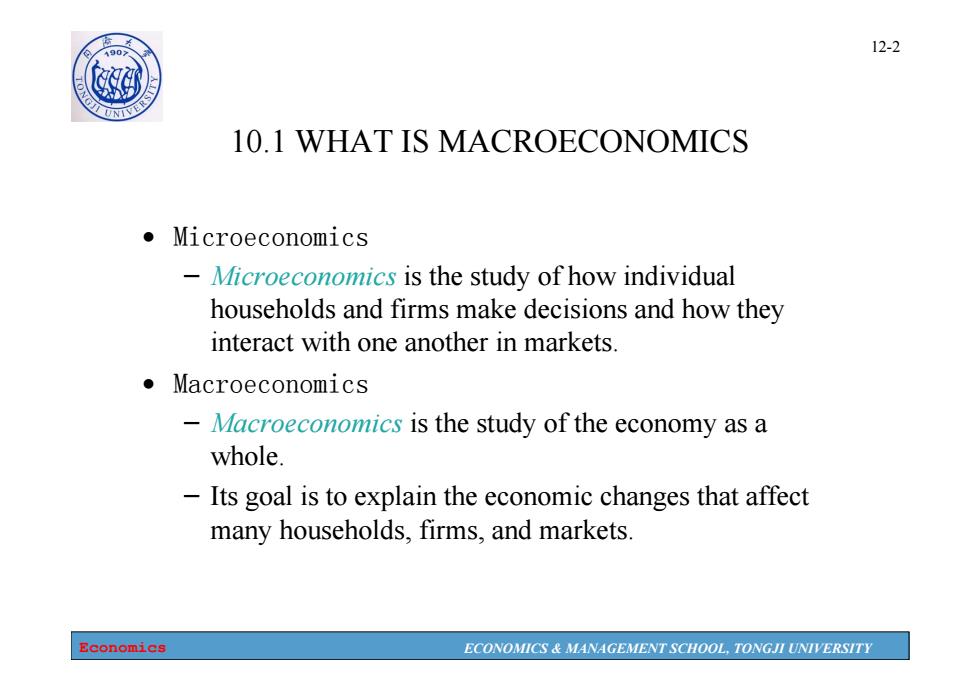
490 12-2 10.1 WHAT IS MACROECONOMICS ●Microeconomics Microeconomics is the study of how individual households and firms make decisions and how they interact with one another in markets. ●Macroeconomics Macroeconomics is the study of the economy as a whole. Its goal is to explain the economic changes that affect many households,firms,and markets. Economics ECONOMICS MANAGEMENT SCHOOL,TONGJI UNIVERSITY
Economics ECONOMICS & MANAGEMENT SCHOOL, TONGJI UNIVERSITY 12-2 10.1 WHAT IS MACROECONOMICS • Microeconomics – Microeconomics is the study of how individual households and firms make decisions and how they interact with one another in markets. • Macroeconomics – Macroeconomics is the study of the economy as a whole. – Its goal is to explain the economic changes that affect many households, firms, and markets
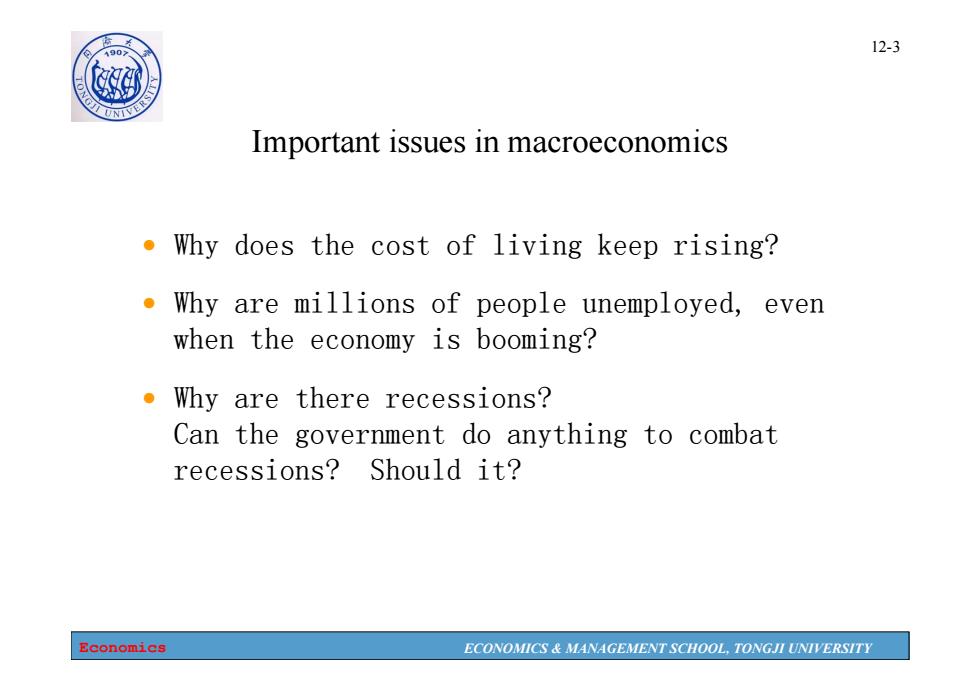
12-3 Important issues in macroeconomics Why does the cost of living keep rising? Why are millions of people unemployed,even when the economy is booming? Why are there recessions? Can the government do anything to combat recessions?Should it? Economics ECONOMICS MANAGEMENT SCHOOL,TONGJI UNIVERSITY
Economics ECONOMICS & MANAGEMENT SCHOOL, TONGJI UNIVERSITY 12-3 Important issues in macroeconomics • Why does the cost of living keep rising? • Why are millions of people unemployed, even when the economy is booming? • Why are there recessions? Can the government do anything to combat recessions? Should it?

190 12-4 Important issues in macroeconomics What is the government budget deficit?How does it affect the economy? Why does the U.S.have such a huge trade deficit? Why are so many countries poor? What policies might help them grow out of poverty? Economics ECONOMICS MANAGEMENT SCHOOL,TONGJI UNIVERSITY
Economics ECONOMICS & MANAGEMENT SCHOOL, TONGJI UNIVERSITY 12-4 Important issues in macroeconomics • What is the government budget deficit? How does it affect the economy? • Why does the U.S. have such a huge trade deficit? • Why are so many countries poor? What policies might help them grow out of poverty?
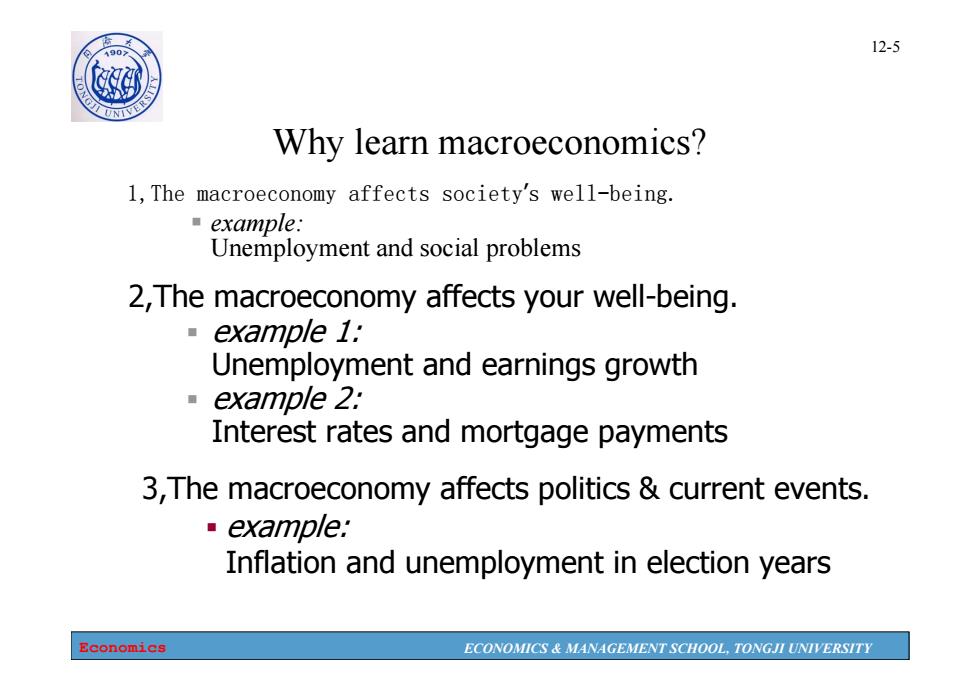
12-5 N Why learn macroeconomics? 1,The macroeconomy affects society's well-being. ■example:. Unemployment and social problems 2,The macroeconomy affects your well-being. example 1: Unemployment and earnings growth example 2: Interest rates and mortgage payments 3,The macroeconomy affects politics current events. example: Inflation and unemployment in election years Economics ECONOMICS MANAGEMENT SCHOOL,TONGJI UNIVERSITY
Economics ECONOMICS & MANAGEMENT SCHOOL, TONGJI UNIVERSITY 12-5 Why learn macroeconomics? 1,The macroeconomy affects society’s well-being. example: Unemployment and social problems 2,The macroeconomy affects your well-being. example 1: Unemployment and earnings growth example 2: Interest rates and mortgage payments 3,The macroeconomy affects politics & current events. example: Inflation and unemployment in election years
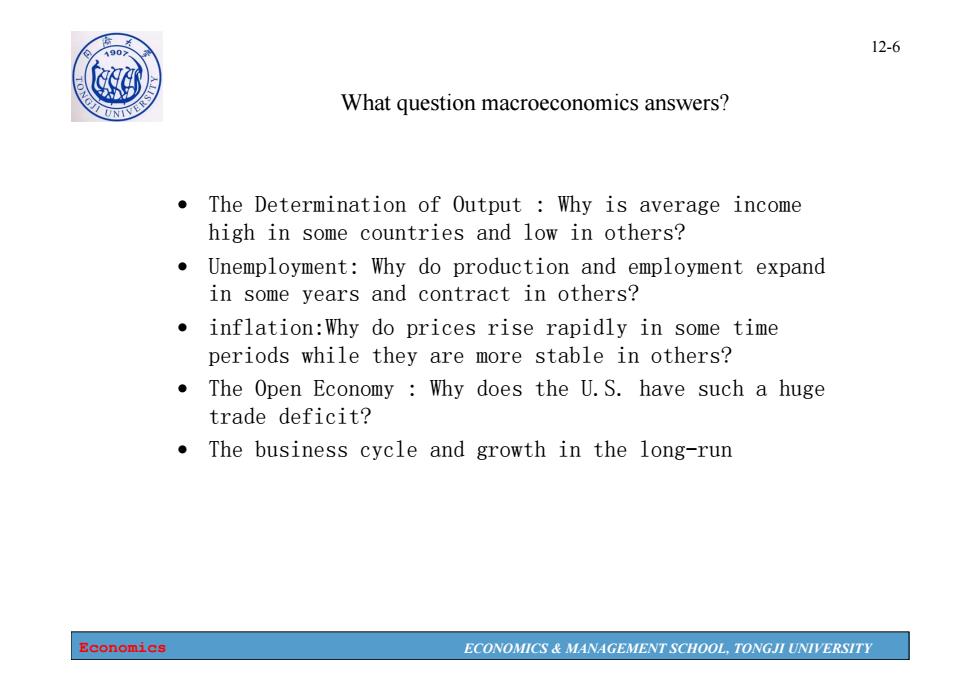
1907 12-6 What question macroeconomics answers? The Determination of Output Why is average income high in some countries and low in others? Unemployment:Why do production and employment expand in some years and contract in others? inflation:Why do prices rise rapidly in some time periods while they are more stable in others? The Open Economy Why does the U.S.have such a huge trade deficit? The business cycle and growth in the long-run Economics ECONOMICS MANAGEMENT SCHOOL,TONGJI UNIVERSITY
Economics ECONOMICS & MANAGEMENT SCHOOL, TONGJI UNIVERSITY 12-6 What question macroeconomics answers? • The Determination of Output : Why is average income high in some countries and low in others? • Unemployment: Why do production and employment expand in some years and contract in others? • inflation:Why do prices rise rapidly in some time periods while they are more stable in others? • The Open Economy : Why does the U.S. have such a huge trade deficit? • The business cycle and growth in the long-run

12-7 0 Objectives of Macroeconomics (a)high levels and rapid growth of output and consumption Loutput is usually measured by the gross domestic product (GDP),GDP should be close to potential GDP,the maximum sustainable or high-employment level of output]; (b)low unemployment rate and high employment, with an ample supply of good jobs; (c)price-level stability (or low inflation). .(d)balance of international payment Economics ECONOMICS MANAGEMENT SCHOOL,TONGJI UNIVERSITY
Economics ECONOMICS & MANAGEMENT SCHOOL, TONGJI UNIVERSITY 12-7 Objectives of Macroeconomics • (a) high levels and rapid growth of output and consumption [output is usually measured by the gross domestic product (GDP), GDP should be close to potential GDP, the maximum sustainable or high-employment level of output]; • (b) low unemployment rate and high employment, with an ample supply of good jobs; • (c) price-level stability (or low inflation). • (d) balance of international payment
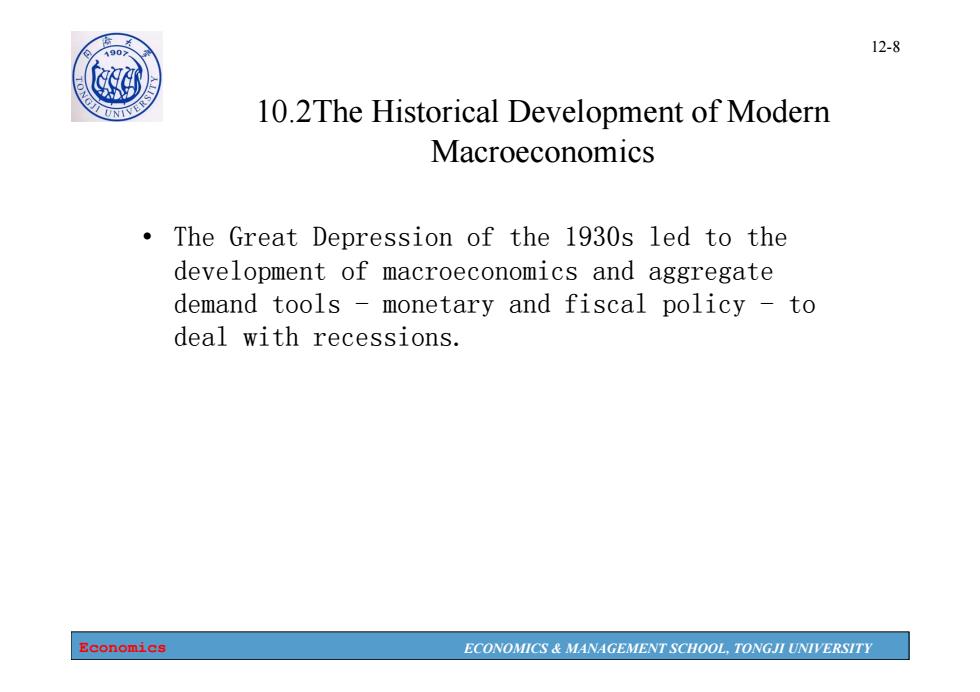
490 12-8 10.2The Historical Development of Modern Macroeconomics The Great Depression of the 1930s led to the development of macroeconomics and aggregate demand tools -monetary and fiscal policy -to deal with recessions. Economics ECONOMICS MANAGEMENT SCHOOL,TONGJI UNIVERSITY
Economics ECONOMICS & MANAGEMENT SCHOOL, TONGJI UNIVERSITY 12-8 10.2The Historical Development of Modern Macroeconomics • The Great Depression of the 1930s led to the development of macroeconomics and aggregate demand tools - monetary and fiscal policy - to deal with recessions

12-9 From Classical to Keynesian Economics Pre-Depression economists are called Classical economists. They felt the market was self-adjusting. They focused on long-run issues such as growth. Economics ECONOMICS MANAGEMENT SCHOOL,TONGJI UNIVERSITY
Economics ECONOMICS & MANAGEMENT SCHOOL, TONGJI UNIVERSITY 12-9 From Classical to Keynesian Economics • Pre-Depression economists are called Classical economists. • They felt the market was self-adjusting. • They focused on long-run issues such as growth

12-10 10 From Classical to Keynesian Economics Depression-era economists are called Keynesians after John Maynard Keynes. They focused on short-run economic issues. Keynes is the founder of macroeconomics and author of The General Theory of Employment,Interest and Money. Economics ECONOMICS MANAGEMENT SCHOOL,TONGJI UNIVERSITY
Economics ECONOMICS & MANAGEMENT SCHOOL, TONGJI UNIVERSITY 12-10 From Classical to Keynesian Economics • Depression-era economists are called Keynesians after John Maynard Keynes. • They focused on short-run economic issues. • Keynes is the founder of macroeconomics and author of The General Theory of Employment, Interest and Money